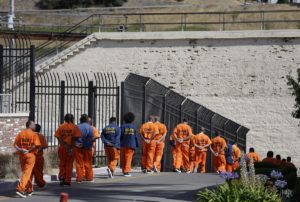
A row of general population inmates walk in a line at San Quentin State Prison. Credit: AP/Eric Risberg
The largest prison work strike in U.S. history has entered its third week. Organizers report that as of last week, at least 20 prisons in 11 states continued to protest, including in Alabama, California, Florida, Indiana, Louisiana, Michigan, New York, Ohio, South Carolina and Washington. The Incarcerated Workers Organizing Committee says at one point, about 20,000 prisoners were on strike. With protest has come punishment. Several facilities have been put on lock-down, with prisoners kept in their cells and denied phone access both before and during the strike. Organizers have also been put in solitary confinement.
TRANSCRIPT:
JUAN GONZÁLEZ: The prison guard work strike at the Holman Correctional Facility in Alabama comes as the largest prison work strike in U.S. history has entered its third week. Organizers report that, as of last week, at least 20 prisons in 11 […]

A yellow-faced bee in Hawaii. They are at risk from habitat loss and non-native species.
Credit: John Kaia/AP
Seven types of bees once found in abundance in Hawaii have become the first bees to be added to the US federal list of endangered and threatened species.
The listing decision, published on Friday in the Federal Register, classifies seven varieties of yellow-faced or masked bees as endangered, due to such factors as habitat loss, wildfires and the invasion of non-native plants and insects.
The bees, so named for yellow-to-white facial markings, once crowded Hawaii and Maui but recent surveys found their populations have plunged in the same fashion as other types of wild bees – and some commercial ones – elsewhere in the United States, federal wildlife managers said.
Pollinators like bees are crucial for the production of fruits, nuts and vegetables and they represent billions of dollars in value each year to the nation’s agricultural […]










